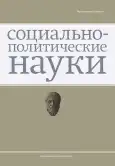Сирийский фактор в современных российско-иранских отношениях
- Авторы: Антощенко Д.В.1
-
Учреждения:
- Санкт-Петербургский государственный университет
- Выпуск: Том 13, № 2 (2023)
- Страницы: 168-172
- Раздел: Международные отношения, глобальные и региональные исследования
- URL: https://bakhtiniada.ru/2223-0092/article/view/145539
- ID: 145539
Цитировать
Аннотация
Цель исследования. В статье рассматриваются позиции и интересы РФ и Ирана в сирийском кризисе; проблемы влияния акторов Ближневосточного региона на отношения Ирана и РФ. Анализируются современная обстановка в Сирийском конфликте и российско-иранские отношения; тенденции и перспективы развития отношений РФ и ИРИ в рамках сирийских событий. Целью исследования является установление и выявление роли и значения Сирийского конфликта, а также его влияние на российско-иранские отношения и их дальнейшее развитие в ближневосточном регионе. Выводы. В результате проведенного исследования автор приходит к выводу, что Иран является государством, которое влияет на российско-американские отношения в контексте сирийского кризиса. Региональные акторы оказывают немалое влияние на сирийские события, а также нахождение России и США на территории САР. Это проявляется в открытой конфронтации США с Ираном и его сдерживания всеми возможными способами. Автор делает вывод, что Иран выражает схожесть взглядов с Россией в контексте событий в Сирии и поддерживает режим Асада, так как Сирия является одним из немногих региональных партнеров.
Полный текст
Открыть статью на сайте журналаОб авторах
Диана Вадимовна Антощенко
Санкт-Петербургский государственный университет
Автор, ответственный за переписку.
Email: diana12344321@bk.ru
ORCID iD: 0000-0003-4887-7189
выпускница аспирантуры факультета международных отношений Санкт-Петербургского государственного университета. Санкт-Петербург, Российская Федерация.
Россия, г. Санкт-ПетербургСписок литературы
- O’Делл М. Ближний Восток: ветер перемен государственности и демократии (опыт для России и стран СНГ) // Материалы международной научно-практической конференции «Государство, Конституция, Родина» 23 мая 2013 г. / под ред. д-ра юрид. наук Л.В. Голоскокова. М.: Изд-во Финансовый университет при Правительстве РФ, 2013. Гл. 11.
- Ахмадуллин В.В. Анализ интерпретации термина «Ближний Восток» западными авторами // Власть. 2014. № 4. С. 126–130.
- Беленькая М. Решают на четверых // Коммерсантъ. 03.04.2023. URL: https://www.kommersant.ru/doc/5913628
- Бруно Г. Религия и политика в Иране. 19.06.2008. URL: https://www.cfr.org/backgrounder/religion-and-politics-iran
- Букин А.В. Борьба за политическое лидерство на ближнем востоке между Саудовской Аравией и Ираном: Дис. ... канд. полит. наук: 23.00.04. М.: РУДН, 2016. 186 с.
- Вартаньян Э.Г. Внешнеполитический курс исламской республики Иран в 1990-е гг. – начале XXI в. В контексте региональной безопасности // Голос минувшего. 2014. № 1-2. С. 147–156.
- Вахшитех А.Н. Россия и Иран в сирийском урегулировании: стратегическое партнерство или тактический союз? // Власть. 2019. Т. 27. № 1. С. 279–287.
- Взаимоотношения Ирана и Сирии // ИА Красная Весна. 03.04.2023. URL: https://rossaprimavera.ru/news/162b7e60
- Ганиев Т.А., Карякин В.В. Большой Ближний Восток: геополитическая регионалистика конфлитогенного центра мировой цивилизации // Электронный научный журнал «Архонт». 2018. Вып. № 4 (7). С. 15–28.
- Джонстон Т., Лейн М. Развитие иранского посредничества в Йемене и будущее движения хуситов. Могут ли хуситы стать следующей «Хезболлой»? Каталогизация данных Библиотеки Конгресса при публикации. 2019. С. 73.
- Имаков Т., Семедов С. Хомейнизм – идеология политического ислама // Россия и мусульманский мир. 2011. № 5 (227). С. 123–135.
- Йылдырым А.К. Религиозные партии и идеологические изменения: сравнение Ирана и Турции // Political Science Quarterly. 2020. № 135 (4).
- Кортунов А.В., Дюкло М. Иран на Ближнем Востоке: часть проблемы или часть решения? // РСМД. URL: https://russiancouncil.ru/analytics-and-comments/analytics/iran-na-blizhnem-vostoke-chast-problemy-ili-chast-resheni
- Лукоянов А. Иран: взгляд без предубеждения // Россия в глобальной политике. 2008. № 1. С. 120–130.
- Мамедова Н.М. Политическая система Исламской Республики Иран: особенности и возможности трансформации // Контуры глобальных трансформаций: политика, экономика, право. 2018. Т. 11. № 3. С. 152–165.
- Рокнифард Ю.В. Внешнеполитический курс Исламской Республики Иран в контексте развития национальной ядерной программы: Автореф. дис. ... канд. истор. наук: 07.00.15. М.: Ин-т востоковедения РАН, 2016. 23 с.
- Халиль У.Ф. Дворец американской мечты: опыт Ближнего Востока и становление государства национальной безопасности. Кембридж, Массачусетс: Изд-во Гарвардского ун-та, 2016. 440 с.
- Хандогин К.Ю. Идеология Хомейнизма и ее влияние на формирование концептуальных основ внешней политики Ирана // Власть. 2011. № 10. С. 111–114.
- Чапанова М.А. Исламская экономическая модель в Иране: предпосылки и тенденции развития // Азия: вектор развития внешнеэкономического сотрудничества с Россией в условиях санкций. Ежегодник – 2016: сб. ст. / под ред. Л.В. Шкваря. М.: РУДН, 2016. С. 202–214.
- Шишков В.В. Перспективы образования неоимперских центров в арабо-мусульманском мире: политологический анализ // Вестник международных организаций. 2014. Т. 9. № 4. С. 177–195.
- Юртаев В.И. Особенности современной внешней политики Ирана // Вестник РУДН. 2012. С. 13–20.
Дополнительные файлы








